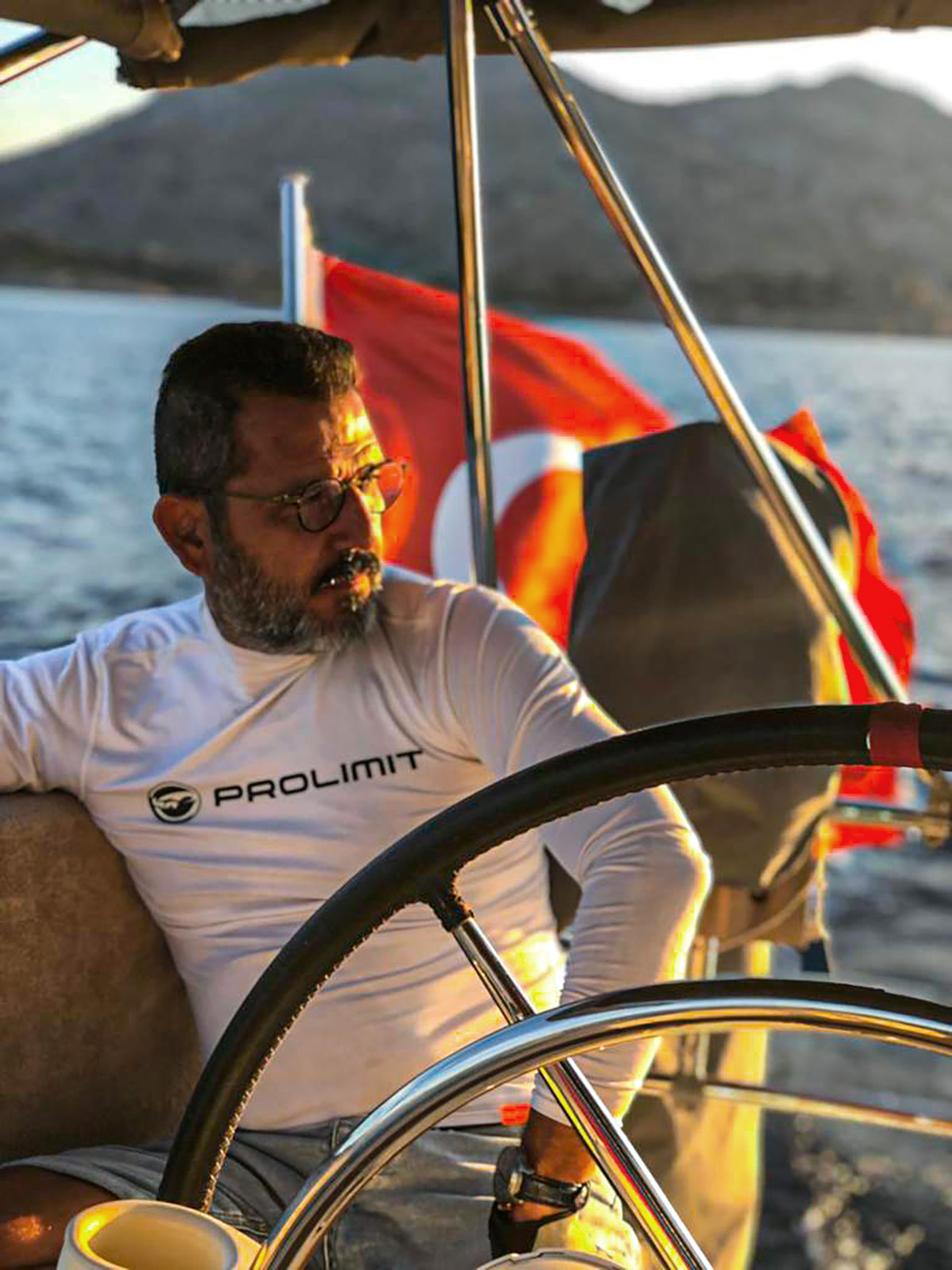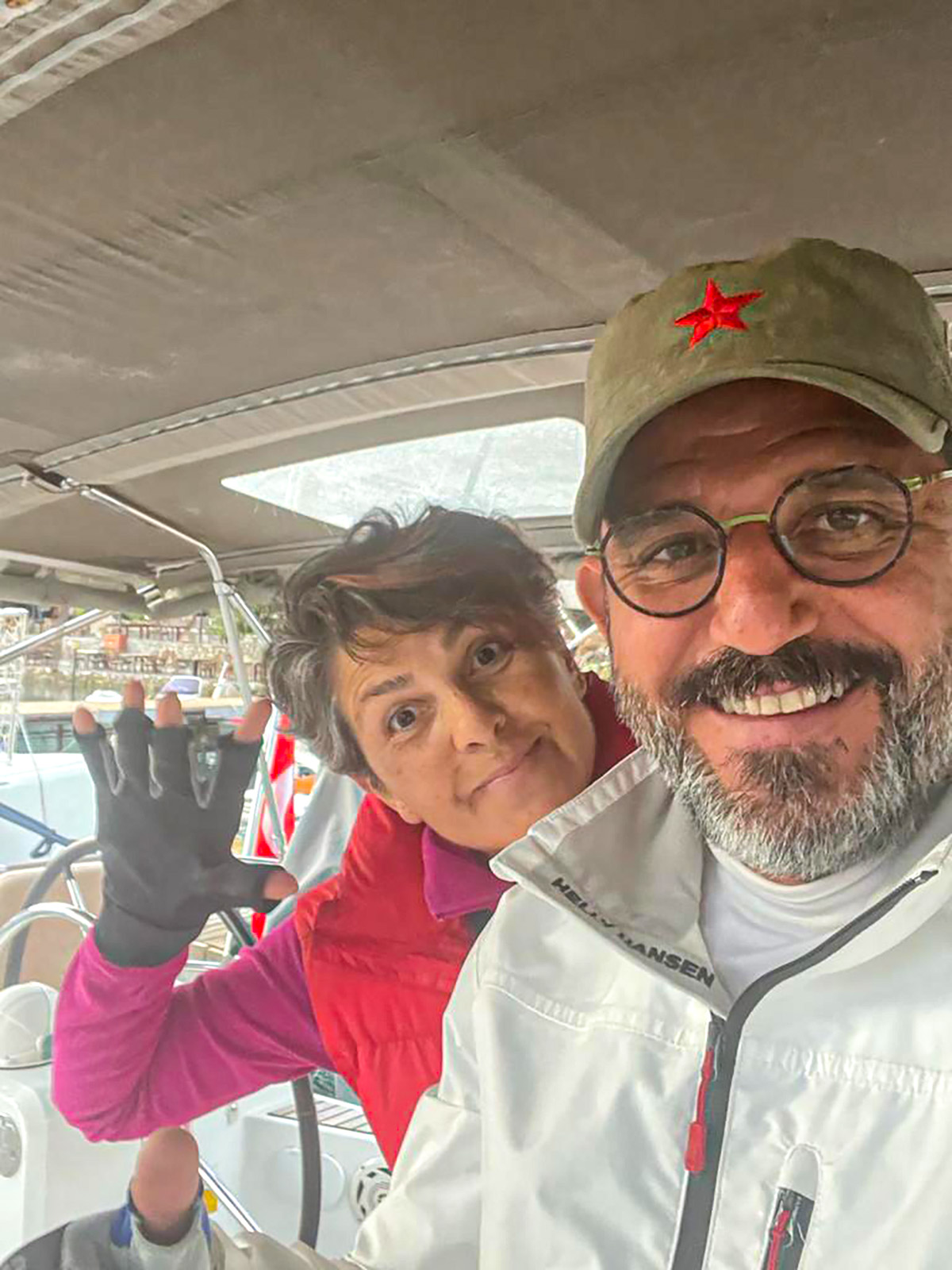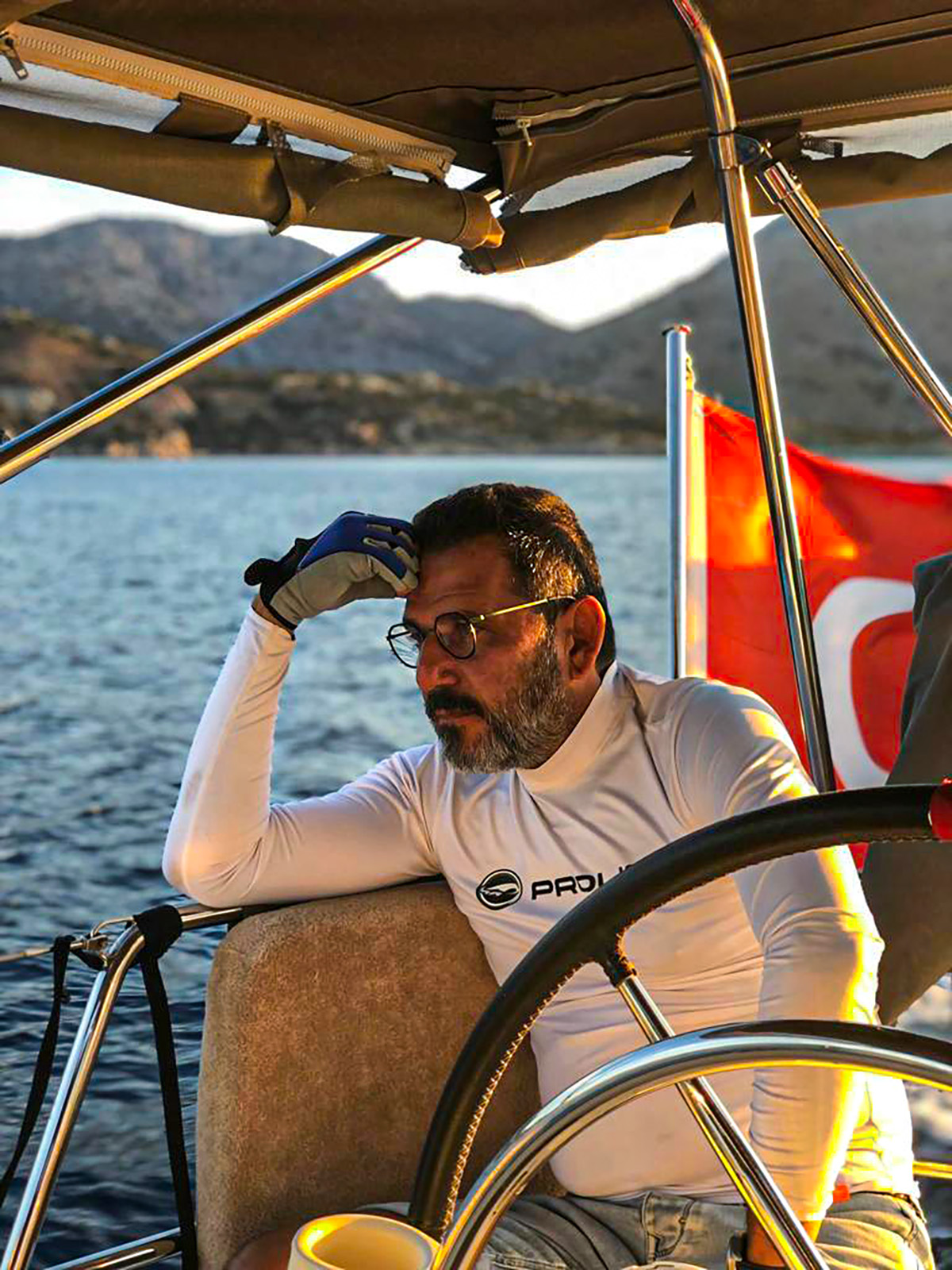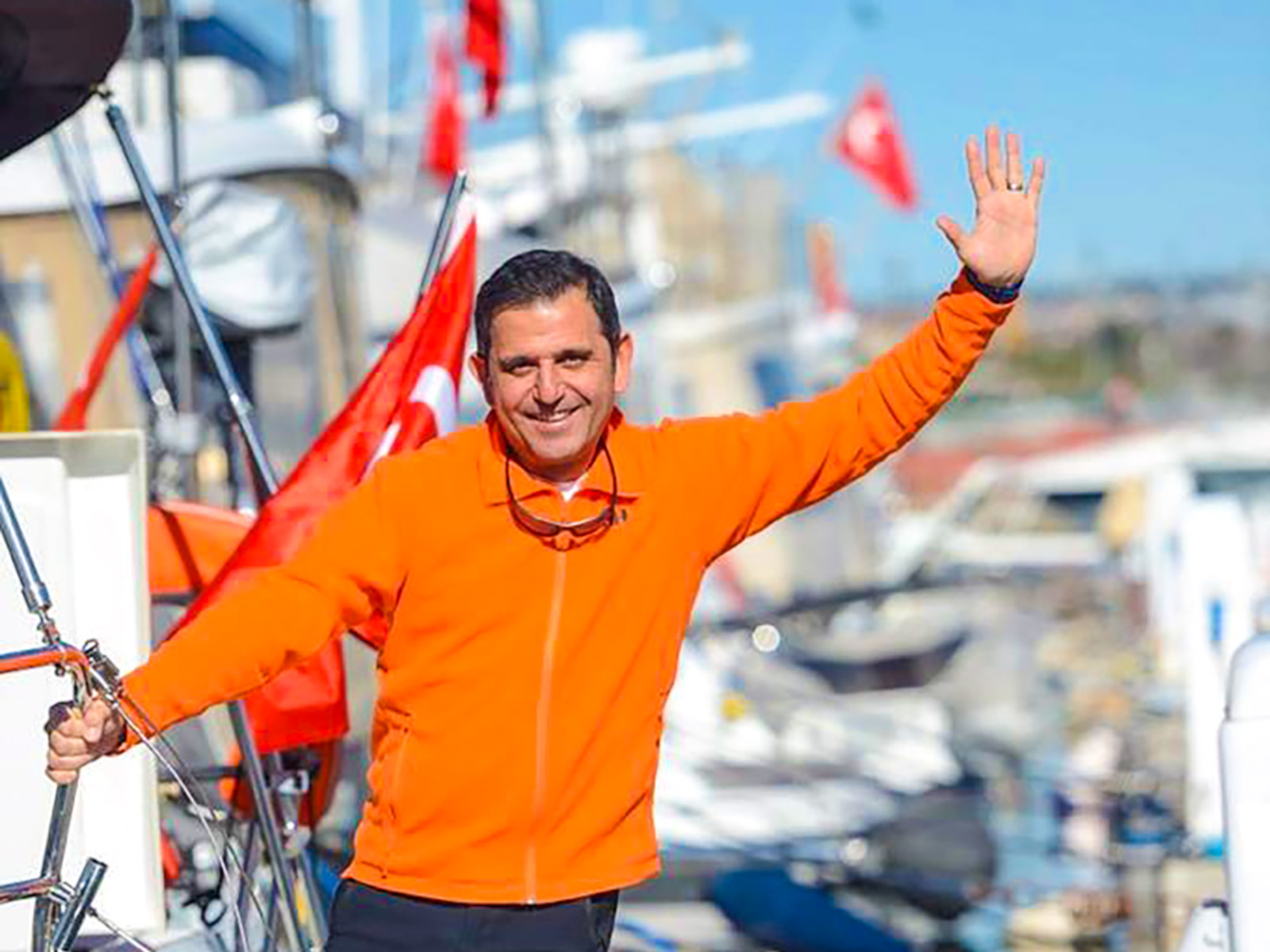Fatih Portakal: The Sea Disciplines People
For some, freedom is everything. In business life, in free time, while thinking, even while sleeping... Living means freedom. Especially for journalists! If a person is free in his mind and free in his conscience, his choices will be just as free. When Fatih Portakal announced that he was going to retire two years ago, when he was at the top of his profession, most people did not believe it. Some thought he took this decision for other reasons. Those who knew him closely, who had already met his free spirit, were not so surprised. Fatih would embark on a new path and build a new life. A life in which there is peace, joy and, without a doubt, the sea. Neverthless, some professions cannot be taken off like clothes and put in the closet. That's why, when we called, Fatih Portakal was on the phone again, still in search of news...

Fatih Portakal: Okay, okay. I don't know if it has come! Ok I will, I will let you know. Okay. OK, Bye! I'm back, sir, I'm with you now.
Kayhan Yavuz: Haven't you retired?
FP: I started YouTube. We are making Fatih Portakal TV.
KY: Then, good luck with it!... I would like to start with İzmir. When you quit television, you left Istanbul and settled in Seferihisar. Where does this Izmir love come from?
FP: I was actually born in Aydın. When I go to Aydın, they ask me where I'm from; of course it's not appropriate to say that I'm from Izmir so I say Aydın. But elsewhere, my answer to the question "Where are you from?" is Izmir. I came here when I was 20 days old. I went to primary school in İzmir, secondary school in İzmir, and high school in İzmir. I only went to Istanbul to study at the university. After that, I stayed in Istanbul for my job. Other than that, I don't have an emotional connection with Istanbul. But I have deep ties with İzmir, Aydın, Nazilli and its district, Karacasu. I also have such ties with Marmaris. If you ask me "What does Istanbul mean to you?", for me it is a big city, a city of opportunities. Apart from that, it is a big, crowded city in which people sometimes step on you and wear you out. It's actually a big village for me! The people of our village, I mean, İzmir, are more friendly. Here, there are people who say "Good morning" to you before you say anything in the morning. So I am happy to live in this village.
KY: I also love this thing about İzmir: You make a plan to meet someone. He says let's meet in front of such liquor store, which I don't know. Actually, it turns out it became a bank branch 10 years ago. But the people of Izmir still call it the liquor store. Moreover, they understand each other. İzmir has such a unique world.
FP: Yes, Izmir has a different mindset. I think people of Izmir are unique, relaxed. Maybe they're a little bit self-indulgent. But they enjoy life. It has a slightly more liberal structure, a slightly more modern structure, and not such a cosmopolitan structure. It raises people to be more self-confident. This atmosphere of İzmir has shaped me as well.
KY: Of course, you saw the sea for the first time in İzmir...
FP: From the moment I opened my eyes, the sea was in front of me. We were living in Güzelyalı, İzmir. Our house had a beautiful view. Imagine a house on the hill. The whole Bay is under our feet. The most important feature of Izmir's houses was that they had balconies. Once April came, the weather got better, tables would be placed in the balcony. People would eat and drink there until the end of summer. We would eat on the balcony until the end of September. Nice smells would rise from those tables. The smell of the sea, the warm smell of the air, and the imbat (cool Aegean summer sea-breeze) would mix with that smell. When we sensed that smell, we used to say, "Here comes the summer". For example, here in Seferihisar, I can still sense that smell. I miss those days so much.
KY: Izmir has another difference. Something universal, beyond borders. When I went to Izmir when I was a kid, I was most surprised by this: You can listen to Greek radios from your home. You actually hear another country. I guess this is called being a Mediterranean. Even in our Mediterranean cities, it is as if that Mediterranean spirit cannot be felt as much as in Izmir.
FP: I went to Izmir last year. While I was coming, I switched on the radio and found a Greek radio again. Nice music was playing too. I don't understand the language but it's nice. Being a Mediterranean is something special. It is something that suits the free character of İzmir very well.
KY: How much space did the sea take up in your childhood?
FP: Our house was very close to the sea. We would immediately go down to the shore. They would call it "Yalı". We used to catch slug fish with lines wrapped in cork like this. They were inedible, of course, but rarely we would also catch sea bream. Of course, the Gulf smelled very bad back then. But I even soaked in that water. Not from the Güzelyalı side, but from the İnciraltı side, a little further towards Balçova, towards the peninsula. Such places were considered clean.
KY: How did this love for the sea turn into living on a boat one day?
FP: 7-8 years ago. I have a friend in Izmir, a boatman for 30-35 years. His name is Muzaffer, his boat is called Muzo. We would go to his boat. Sometimes we were 5-6 people on the boat. We ate, drank, went to the bays. Muzaffer impressed me a lot. He is a pharmacist, he has a stressful job. But he used to go to the boat to relax. I looked at him and thought I might do the same. With Muzaffer's approval, I bought a boat and named it "Anchorman".

KY: There is a double joke.
FP: Yes, there is the "anchor man" joke. I rode that boat for a year and a half. Then I bought Muzo.
KY: It gets serious when you get your own boat.
FP: Sure, it's all beer and skittles while you get on your friend's boat. You've never been at the helm, you haven't exited. You give little gas or too much gas to the engine, you don't worry at all. I was at point zero when I bought the boat. Then you're afraid, of course! I said "What have I done?" It's not like driving a car. You're on the sea, it doesn't stop the moment you hit the brakes. Also, people interfere from the shore. They say things like "Wharf the boat!" or the other. Lots shout out saying things like that. I mean, then you get in a tizzle. As a matter of fact, when I bought the boat, I have friends named Muzaffer and Meriç, they came from Izmir, they would stay on the boat. They said, "Let's go to the island". "I can't go," I said. Muzaffer took the boat, he took it to the island.
KY: But you didn't give up and in the end, you got the hang of it.
FP: Then I started the trainings and progressed. For example, I made a 10-hour long cruise alone. I was on the boat for the last two years when I was living in Istanbul. My house was in Kalamış, and the boat was right there in the marina. But I usually lived on the boat, not at home. During that pandemic, the boat was a savior for me. My house was a five-minute walk from the marina. I would go to the house just to have a shower or do my laundry. I had 37.2, a small boat. Actually, the boat wasn't that expensive back then, so you don't buy a summer house, you buy a boat. I made a choice to that effect. When I came home from work in the evening, I would say, "Brother İsmail, drop me on the boat." I would go to the marina, I would sit there, I would go to the boat from there. If the weather was nice, I enjoyed it a lot. There was boat closure, in winter, friends would come and we would sit. When the weather was nice, we would set sail for the islands. Having a boat infused a strange feeling of freedom into me. And then you start to wonder if I can't keep it up.
KY: So it comes back to the issue of freedom. Free journalism, free seafaring, they all come from the same root.
FP: Of course it does. You go to the islands for half a day, eat your dinner, lie on the boat. Especially in Marmaris, Yeşilova Bay, to where I went, those shores of Selimiye and Orhaniye are so beautiful! Especially when the crowd of July hasn't arrived yet, until the end of June or the first week of September... There are such beautiful, undiscovered coves there! You can go and live freely, you can anchor anywhere you want. In fact, once two or three boats come, you say this place got crowded and you run away. The sea also has such a feature. I mean, it's both liberating, calming and makes you be mindful. These are very important feelings. Maybe it makes you lonely a bit, but in the end, it draws you into such an enjoyable and peaceful life. It imprints such happiness into you, which in turn connects you more to life.
KY: As an anchorman, if we ask people what makes you different from others, I think they would say "your freedom".
FP: That's right. But I was always like this. I don't remember much, but my friends say so. For example, in high school, as the class president, I would tell the teacher certain matters. I don't know, it was the same while I was at the university too. I always claimed my freedom in the places I worked, but I always met such people. Everyone knew where to stop. We had a good working period without damaging our friendships.
KY: You also had a long journey in journalism. But then you suddenly stopped being an anchorman. It's not usual for someone who has a strong position in our country to give up on this out of the blue, voluntarily.
FP: I always used to say to myself: "Oh boy, leave this at the top!" When I decided to quit, they said, "You can't, you can't, you'll get bored, you'll come back." The man is at the "top". He's making the most watched main news bulletin in Turkey. He also has a position, glory, fame, etc. How would he quit? Who is sending you? The boss didn't want you? No friend, I'm bored now! I said, "What are we working for?" What will I do with all that money every month? I have a house, I have a car, I have good friends. There's nothing more than that! I don't need more. But there's also this, of course, you deal with penalties, proceedings, etc. every day. These things shouldn't happen, these are not good things. In fact, I was fined once, in all the others the money came back. Then I don't want to fall out with my friendships. The late Mehmet Ali Birand used to say at the meetings, "I love the news and I want to die while presenting the news." He died while presenting the news. I've never had such a problem. I want to age healthy. I said okay, I'm leaving. I came here. The distance between my home and work is now 20 seconds. I have no regrets. Now I'm making YouTube as well. I get my enthusiasm there too. I think the sea had a big impact on my decision to retire. If it were not so, I would never have such vast thoughts or have a life in the rhythm of the earth. I'm trying to explain how to live without being under the yoke of anyone.
KY: In this lifestyle change, there is a "I don't need more" mentality. However, today's world is dominated by a "culture of waste". On this matter, it seems to me that the sea has something to teach people. For example, the sea teaches people to be frugal. Will this waste culture change or what?
FP: I think the sea really has a lot of positive values that it brings to people, to their character and to their lives. When you sail, you prefer a minimal life. For example, you know you have a certain amount of potable water, like 300 liters or 500 liters, with you. You know that the boat will get heavy when it is overloaded. According to this, you even calculate the water you will drink. For example, when using detergent, you try to buy the one producing the least foam. All of these actually impart frugality to people. You no longer have worries like you have to get that outfit, that shirt, that trousers. You don't throw that plastic bottle into the sea. Of course, there are those who do! You shrink that trash and keep it. Because you don't know when to leave your trash again. Indeed, this is the state of being respectful to the environment. In other words, the boat disciplines man, the sea disciplines man. And I also see this especially in sailors, it improves the sense of courtesy.
KY: So there is something in the sea that connects people to life. I personally think that this whole environmental issue is essentially related to the concept of "consume". There's also the matter of stubbornness. Cihat Burak has a story, a story called Göz (the eye). It's a dystopian text. It is a text that starts with the appearance of man on earth and tells how we will disappear after ages. In essence, there is always stubbornness with nature. You are trying to dominate it. You cannot dominate it but you are getting stubborn.
FP: There is no limit to human consumption. It's the same with us, it's the same in Japan. We are moving towards a world in which it's more difficult to live. This is crystal clear! As the world population grows, more people will have to consume those limited resources. There are other problems too. Climate change, air pollution, drought, migrations, wars, disruption in the food supply chain. Despite these problems, consumption is increasing at an extraordinary rate, never slowing down. I saw a new post yesterday. 40 percent of the world's population is currently facing hunger. In Turkey, the Union of Chambers of Agriculture of Turkey clearly says: Water resources are not used efficiently, we are faced with a great risk of drought. Scarcity is also scarcity for the rich man. Waste is the biggest problem of the whole world. Here you see the amount of pollution in the seas. People threw their garbage bag into the sea, I saw it in Yeşilova Bay with my own eyes. We are destroying the world with our own hands. To what extent can we talk about the beauty of life in such a world? We say peace, we say joy, but when you see that garbage bag in the sea, you don't have peace. You're out of words. The thing is, you can't change human beings. If you tell a society that is used to spending and consuming this much to consume less, you'll start a fight. I think that opportunity has been missed, that controlled consumption habit which we once had has been lost. This is not only about the sea, there is also concretion on the shore. Go to Kaz Mountains where there is greenery, you see the same problem there. It is the same in the mountains of Marmaris. I think that the next generation will no longer be able to have these, and will have to struggle with famine. After 10-15 years, the topics to be discussed will be issues such as drinking water, eating and drinking habits, and waste. How will you solve it? Tough! Are you going to tell the man not to eat or drink? Now this issue seems to have changed a bit due to high cost of living. For example, half a watermelon is sold for the first time this year. On the bright side, you shop in moderation. Don't buy full, buy half! But not because you're prudent but because of high cost of living.

KY: We have another major topic in Highlights: cultural continuity. For example, the fisherman of Halicarnassus has made a great contribution to the oranges grown in the Mediterranean today. He brought seeds from abroad in time. Today, for example, people export oranges but do not know the Fisherman. It seems to me that this creates a culture and even identity problem. The same goes for marine culture. It amazes me personally that we are neighbors to such wide seas and lag behind in marine culture. Can there be conservation without culture? Wouldn't that bag continue to float in the sea?
FP: Frankly, a state policy is needed in these matters. The policy of popularizing the sea. Those who govern us need to reconcile people with the sea. When you go to the Greek islands, you see how people live in peace with the sea. Greeks have a different view of the sea. The sea is their benefactor. You see how they address marine tourism. It seems we always think of tourism on land. For example, how much tourism is there in the Black Sea, how many sailing enthusiasts are there? Does Black Sea only mean fish or anchovy? Yes, it's present in the Mediterranean, in the Aegean. But this is something that happened not with a state policy, but with the personal efforts of people. But if we could make this a state policy and spread it to the whole country... Then you'll see that both our perspective on people and society will change, and maritime culture will be very beneficial for our development. I guess tourism will also be very different. The economy in the Greek islands is supported by people from Europe and people from Turkey. This is how they get by. There is a small island right next to our Çeşme, that is, an island called Inossa, about five miles away. An island where famous Greek shipowners grew up. They told me at least five shipowners. They grew up there and became world-renowned shipowners. Think about it, these guys are from a tiny island.
In summary, first of all, this will be state policy. Second, it will start at a young age. After the age of 50, it is not easy to learn and find means to engage in such things. Think, for example, if courtesy at sea lessons begin to be given starting from primary school... God knows how polite a society we would turn into! Or the love of the sea or the love of green lessons. You don't do these things, then you say our country is surrounded by sea on three sides, of course this doesn't make much sense.
KY: Nowadays, there is a democracy lesson in primary schools. I guess we'll get the fruits of it one day...
FP: Of course, you have to look at the mentality of the lecturer. Do they really teach the course according to international democracy literature or standards? It is necessary to look at it.
KY: So let me ask you a couple of classic questions now. Because people are curious. There are places that sailors and seafarers love, that they don't want to say too much about, so that they aren't discovered and remain intact. Are there any corners that you love like this but that you don't want to tell anyone about?
FP: There aren't many secrets anymore. All bays are more or less known. The books written by old generations are now used for decoration purposes. You download the apps now. What is the depth, can the boat enter or not? You see everything. But there is somewhere called Kocabahçe in Hisarönü Bay that I love. Just before Dirsek Bay. A deep cove, a beautiful cove. It also has a nice restaurant. I love that place. The bay of Turgut Village is also very beautiful. Right between Selimiye and Orhaniye, it is like a bowl. The sea is very beautiful and deep. There is also a place called Sucagiz across Turgut, next to Bencik Bay. I like it there too. Especially if you go there at such a convenient time! There are several small coves there. Large enough to fit in one boat. When we go down further south, I like Bozukkale in there. Just when you turn towards Marmaris from the tip of Yeşilova Bay. It has such a dramatic atmosphere. I like the color of the stones. There is also a small cove right next to it. I don't know its name, but I know its location on the map. It's tiny, sweet, pleasant, there is no facility in it. Those are my favorite places. For example, I don't like Göcek. Because it gets very crowded. Especially in July and August, you cannot find a place to moor the boat. So much so that when you talk to your spouse or friend on your own boat, you know that if your voice gets a little louder, the other party will hear it and be bothered by it. When would I go to Göcek? After the 15th of September and until the 15th of June, before the schools close. In May, June, April, it's beautiful down there! The sea cleans itself very fast there. It also has that beauty.
KY: Well, do you have an unforgettable memory about the sea?
FP: We were taking the boat down south once. We were at a point before the famous Datça cape. The weather was stormy that day. We were two friends, going with the engine. We were afraid so we didn't open the sail. Behind us was a man sailing like a maniac. He was literally messing with the wind. He was swaying to and fro. We were staring at him in amazement. We were going with the engine just in case something would happen to us, the man was having fun with the boat like a toy. We returned to Knidos, we saw that the man was with us again. He also called out, "Open your sails". We applauded the man. We shouted, saying "Well done man!". I saw that he still didn't close his sails, though we were entering Knidos. The man sailed into the harbor, but I had a difficult time stopping with the engine. Of course, obviously he was very experienced. After that, he lowered his sails, approached the pier, greeted me. Now we meet from time to time. Thanks to the sea, we have such beautiful friendships. Some days, you find yourself at the same table with people you don't know. The sea is always a good friend to people.
Interview: Kayhan Yavuz, Setur Marinas Highlights Editor


